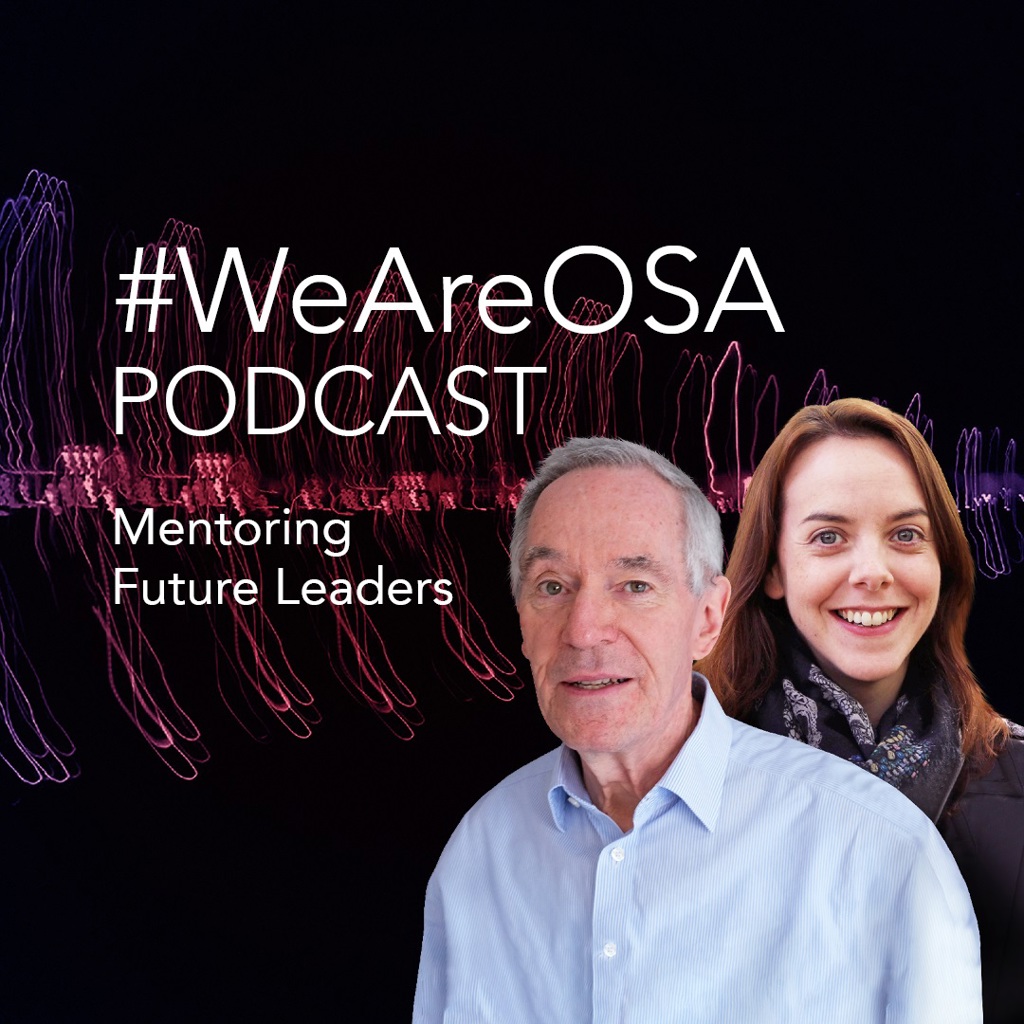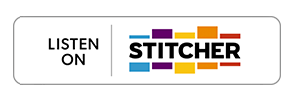Optica Blog
Mentoring Future Leaders
Curtis Burrill, Deputy Senior Director, Outreach Programs
We Are OSA is a new series of podcasts, blogs and articles featuring inspirational stories from scientists & engineers.
Transcript
Megan: Welcome to the We Are OSA podcast, a new series, featuring inspirational stories and perspectives from scientists and engineers, improving the world. In this episode, we'll hear from Arlene Smith,
Arlene Smith: This is the beginning of our podcasting career.
Megan: And her mentor, Chris Dainty
Chris Dainty: In fact, experience is all I’ve got left. I've got a brain cell, but I'm just looking after it very carefully in case I need it.
Megan: Chris Dainty is a former president of OSA and served on the board of directors for two other terms. During his tenure, non-US membership of OSA passed 50% for the first time ever. His mission was to help globalize the society and he made sure to support younger optic students, whenever he could. He's an OSA fellow traveling lecture and the 2003 C E K MEES metal recipient. He lives in Galway Ireland.
Chris Dainty: Well of course I haven't been in a pub for a long time either. So, as you understand, this is quite important for people in Galway.
Arlene Smith: Yes, for Irish people in general.
Megan: Arlene Smith is an optical program manager at AVO Photonics. She was awarded the Ivan P. Kaminow outstanding early career professional prize in 2014. She's also a 2017 OSA Ambassador. Not to mention that she's still really involved within OSA serving on several councils and on OSA's board of directors. Initially though, Arlene saw herself pursuing a career in astronomy. When she first met Chris, that was all she'd studied, but she just started to think a bit more about optics and photonics and wanted to make the leap into the science of light.
Arlene Smith: The time I spent in, in Galway, you know, I did my undergrad in Galway and, and that was, you know, towards the end of my final year when I had to choose this final year project and that's when that's when we met, you know, and that was my first introduction to the group. And I knew at that point, that optics and photonics was the path I wanted to take. And then that was probably our first real mentor mentee situation. Because I remember, I went to you, I went into your office and said, ‘Chris, you know, I really want to do more of this, but I feel like my undergrad was so astronomy based, you know, core physics based. I want to learn more about lasers and optics before I embark on a PhD’.
And when we had that discussion and we talked about various masters programs that I could be looking at applying to, and, and that really set me on my path, you know,
Chris Dainty: During your thesis, you actually had a lot of other support structures. At one point we were over 30 people, you know, whilst you were there. So presumably lots of other people, you know, gave you assistance at least,
Arlene Smith: Oh, certainly, yeah. And that's one thing that I certainly remember very fondly, the comradery and the support, you know, cause we're all in it together. The support there was, yeah, it was just really, really important. If anyone asks, you know, would you do a PhD? Would you do it again? You know, and I would do it again, but I wouldn't do another one. Should we say, and you know, (never). We had postdocs who have kind of come through and stayed on to do extra work or come in with the, you know, their own projects. And, and it was such a diverse group of people, you know, from all over Europe, all over, you know the world probably at some point. And so you, you really learn so much from people and their experiences and it was such a dynamic group in that way.
Chris Dainty: I counted up, I think at one point we had 13 or 14 nationalities in the group. It was, it was very international. Who has been a mentor to you?
Arlene Smith: Well, okay I guess you can go back to the beginning and your family members and your friends over the years kind of guiding you through decisions. But, I would certainly say Chris, that you were a mentor to me. I think that, you know, to, to go through a PhD and to know the, the highs and the lots of lows of that process and, you know, to, to interact with your, that the interactions that you have with your advisors certainly guide you through not just the PhD, but like through your life at that time.
Chris Dainty: Yeah. I, uh, I confess it to certainly obviously regarded my PhD supervisor as a mentor, you know, obviously, but to be honest, I, he was like by supervisor, he wasn't an important mentor. Um, I had other mentors who were well-known people in optics, for example, Charlie Townes, Nobel Prize Winner – he bought me dinner and he wasn't, you know, known for buying people dinner.
Megan: The two bonded over their shared interest in coherence and they worked closely together throughout all of our liens PhD. Through Chris, Arlene entered a brand new community, one that spans the globe connecting great minds. One in which Chris insisted that Arlene belong.
Arlene Smith: You got me involved in OSA. I remember you came to me and one day, probably back in like 2007, 2008 and you said like Arlene, there are these things called student chapters and maybe we should start one in the group and by way you met me.
Chris Dainty: Yes. That's what I always mean. We are very busy here.
Arlene Smith: And so that's how I got involved at OSA you know, looked up the website and fill out the forms, set up the, the student chapter in the group. And, um, and I was actually, it was 2008, um, I went to the first student leadership meeting that was in Rochester, New York. So, um, I'm quite involved. I would say that OSA at the moment I'm, I'm, uh, involved in the OPN, um, editorial advisory committee, I've been chairing the committee for the last few years.
I'm also chair of the MED council. Membership arm of OSA and that role, um, it gives me, uh, a chair or a seat on the board of directors. So I've been on the boards, um, 2020, 2021, which has been a very interesting experience.
Chris Dainty: Can you dish any dirt? Well, obviously, as you know, I sat on the board of directors. Actually, I sat on the board of directors three times or once in the eighties. It's great fun. And I presume you're enjoying it.
Arlene Smith: Yeah. Yes, completely. Well, I wouldn't be doing it if it wasn't fun,
Chris Dainty: You know, and it's, it's, it is educational because, uh, the truth is, um, I think the OSA board, it does things very properly. You know, things are done properly with quality in mind, um, and I certainly learned a lot all the times I was on the board.
Arlene Smith: So Chris, how did you get involved in OSA in the beginning? Because it's a difference between say publishing papers on really then getting involved in the volunteering side of it. How did that start for you?
Chris Dainty: Well, um, it started probably when I was at the University of Rochester. And I was there from 78 to 83. And on one or two occasions, I must've gone down and visited the offices in DC and I met a guy called Jarus Quinn. But he was lovely person I mean, he was, he was so genuine and so passionate for the subject. And I guess I was, as you can tell, as you know, I'm I was shooting my mouth off and he says, yeah, it has just exactly the sort of person we need for the board of directors. I got elected and that was 83 to 85.
Arlene Smith: What's it like being president of OSA? Like that term, especially the year where you were actively precedent on the, on the four years, the full prison sentences to college,
Chris Dainty: actually that year was not such a difficult year. The most difficult year, actually was the first year where you. One of the main, public duties you have is to present awards to people and you do this at the annual meeting and they come up on stage and you present the awards to them. Well, what if you mispronounce their name. What if you miss one out?
Arlene Smith: Oh, no.
Chris Dainty: So actually, cause it was your first year and your first big public event and one that really mattered. The point about that is that when you're giving these awards, obviously it's, it's not about you giving the awards. It's about the awardee, of course. So you really don't want to mess up. You want to do a great job for them.
By the time you get to your third year, which is the year, which you're president, I tell you, they've trained you up; they've got you trained up. When Liz phoned me up to say, to ask me if I'd run, because that's before the election, I said to Liz ‘yeah, I'll run, but will you still be around?’ Well, she says I planned to be, you know we’re talking about mentors and mentees or whatever, but you need a support structure, and to have someone, you know and trust there to help you, is really important. So I was very grateful and she's still whether it's thank goodness, um, because it's a great support.
Arlene Smith: And did you, during that four years, your presidential year, did you, did you travel a lot? Did you, I know you were in and out of the office, so you were on the road a bit, but did you visit student chapters? How did you find that experience? Because the student chapters is such a core part of OSA and so important for OSA's future, I'd be interested to know, like what, what your experience was visiting student chapters.
Chris Dainty: I loved visiting student chapters and still do in fact. And I, and I hope afterwards I can still visit them because, you know, it's, uh, it's a breath of fresh air. Students are just young professors, as far as I'm concerned. I mean, those, those who are on the academic side, they're young professors or they're young industry leaders or whatever. They're just a younger version. I mean, they've got all the capabilities and, well, obviously the experience is less and an experience does count for something. So it was a, it was a busy year. That's why in 2011, while you graduated, so you didn't see me, but you wouldn't have seen me anyway,
Megan: As happens with all students and mentors, there comes a time when the dissertation is finished and the degree is achieved. Sometimes, these relationships have served their purpose, but, sometimes the really good mentor and mentee relationships transition from focusing on your education to envisioning both the career and life you're trying to pursue.
Chris Dainty: After you graduated Arlene, you, you, you went for a short period to Michigan.
Arlene Smith: I, yeah, I got a position and a post-doc position at the university of Michigan and I moved there in 2013 and I was there until I moved to AVO in 2015. So I was there just over two years and that was a great experience because it was completely different to really what I've been doing for my PhD. You know, this was much more in the lab. Um, this was prototyping, tiny endoscopes and doing some optical design work, but really also doing some clinical research, and it was completely different and it was, it was much needed. I wanted to see what it would be like to, to stay in academia. If I had that kind of passion for continuing research or if I would move to industry, and while that was a great time, I really understood at that point that, um, I didn't want to start applying for grants and I didn't really want to go down the tenure track route, but I really enjoyed that we were building these little things in the lab. And so I knew I wanted to move to industry and as they say, get a ‘real job’ and to be involved in actually building things and making things and that's, that's where I am now.
Chris Dainty: Yeah. Well, it's a decision, you know, everyone's gonna make, um, at some point the truth is that in, in optics, most people who do a PhD in optics and photonics will go into will end up in industry. And I think that's, that's good. That's right. That's what it should be. I think it needs a special personality. I'm not saying a great personality. I'm just saying a weird personality perhaps to stay in the academic environment. I mean, I think you, by the way, would have been a great teacher. Um, but I, you know, you would have been fabulous at teaching.
Arlene Smith: I really enjoyed it. I miss it, yeah, I really loved it.
Chris Dainty: It's rewarding. Teaching is very rewarding.
Arlene Smith: I think it's so important, like that to be a lecturer, to be a teacher that's another, you know, a mentor situation, you know. You can have such great interactions with good teachers and they really like can change the path of your career. You know, the, the things that you, you pick subjects that you enjoy, and the teacher really makes it a lot at the time.
Chris Dainty: Absolutely. But that's why I'm so interested in speckle and coherence because of this school teacher. So you're dead right. You’ve put your finger on it. These people can have a incredible influence over your career. Now you're in a real job, but in a real company. So how long have you been in the company and what's your role there now?
Arlene Smith: So I joined AVO back in October, 2015, so I'm there just over five years and I started out as well, my role, I guess, has changed a little over the years, but I started out as, as what we call a product engineer. So we're a manufacturing company. My role in the beginning was very much, you know, get your hands dirty or actually keep them very clean, because it's a clean room. Um, but out on the floor, understanding how, how you actually build things, how you build very small things with very small objects in them, tiny laser packaging, that kind of thing. And so my first role was to, to oversee and understand and support production lines. And then, as I became more, so it was comfortable in that role and learned more about how the company, you know, make things and, and have prototyping happens I then started working as a, an optical program manager. And so that's my main role there now. You see a lot of very interesting problems and that's people hire us to solve them.
Chris Dainty: OK, and that your customers are other companies who may be, want you to package a module in a product they're making. And how many people were there just for interest?
Arlene Smith: So when I started, I was number 51 or 52 or something like that. And now I think we're about 160.
Chris Dainty: Oh, wow. Yeah, that's great.
Megan: Arlene's jump into optics changed her entire career path. It was a choice she arrived at on her own before she met Chris Dainty. But, Chris helped shape her interests and hone her strengths. Likewise, Arlene challenged Chris too with new ways of thinking and an ambitious desire to contribute to the field of light science. It's not hard to imagine the students that Arlene has already left an impression on not to mention the many more she undoubtedly will mentor and inspire as she continues on her trajectory through both AVO and OSA.
Arlene Smith: This is a busy year, like last year and this year is busy with the, with being on the board and, and other things that are happening and
Chris Dainty: Conferences too. Aren't you still involved in conferences?
Arlene Smith: I'm a general chair for the applied industrial optics meeting also. Yeah, right. So still, and will continue to be involved in that. I hope, I don't know. I guess the presidential track is next to me; a little premature perhaps.
Chris Dainty: No, you just say, um, Arlene, I haven't talked to anyone for 45 minutes for years. Isn't it time for a zoom meeting? I know. Yeah, it's, uh, it's great to have a long conversations.
Arlene Smith: This has been really great actually, because we, well, we do connect, uh, often at OSA leadership and other conferences, but it's often a fleeting, you know, quick catch up and move around the cocktail party.
Chris Dainty: Yeah. That glass of white wine. Yes. Yeah. The tonic or whatever it is. Yeah. That's great.
Megan: Chris Dainty and Arlene Smith, remind us all of those important foundational relationships: the ones that have changed the course of our careers and our lives. Perhaps their conversation will inspire you to reach out to an old mentor, to thank them for how they've helped guide you along the way.
Thanks for listening to the, We Are OSA podcast. Special thanks to the voices on this episode for sharing their stories with us. Visit osa.org forward slash we are OSA over the next few months to hear other episodes and read insightful articles.
.

We Are OSA podcast, "Mentoring Future Leaders" featuring, from left to right: Chris Dainty and Arlene Smith
This #WeAreOSA podcast offers a glimpse into the unique rapport between a mentor and mentee with first-hand stories from two OSA members – Chris Dainty, 2011 OSA President, and Arlene Smith, 2020 OSA Board of Directors. Their narrative explores how a mentor-mentee relationship can lead to a long-lasting friendship.
When Arlene started on her PhD journey, she met Chris, who would serve as her advisor and played a key role in shaping her career. While many student-advisor connections fade over time, Chris and Arlene developed a special connection and remain close to this day.
Initially looking to pursue a career in astronomy, Arlene’s shift to optics changed her entire career path. It was Chris who helped shape her interests and hone her strengths. With Chris’s encouragement, Arlene also became heavily involved with OSA moving from student advocate to meetings and publications volunteer to her current position on the OSA’s Board of Directors. Likewise, Arlene challenged Chris too with new ways of thinking and an ambitious desire to contribute to light science.
Chris and Arlene share their mutual passion for photonics and for being a part of a global community connecting great minds.
Featured in this podcast
Chris Dainty is a Research Projects Coordinator with Xperi FotoNation in Galway, Ireland, and holds Emeritus Professor appointments at universities in the UK and Ireland. Dainty received an MSc. in applied optics and a PhD in physics from Imperial College, London in 1969 and 1972.
Dainty’s widespread participation in OSA activities has involved topical meetings, awards and serving as a two-time member of the Board of Directors. Dainty is a recipient of OSA’s C.E.K. Mees Medal and a Fellow.
Dainty served as Chair of OSA’s Centennial Advisory Panel. He received the Robert E. Hopkins Leadership Award for establishing the vision and effective organization of a long-planned, highly successful global celebration of the OSA centennial anniversary, focusing on OSA’s next 100 years of innovation.
In addition to serving as Deputy Editor for Optics Express through 2021, Dainty is an active member of OSA's Presidential Advisory Committee and the Strategic Planning Committee.
Arlene Smith is an Optical Program Manager at Avo Photonics, Inc., USA. After receiving a BSc in Physics and Astronomy from the National University of Ireland, Galway, she started to specialize in optics by earning an MSc in Photonics and Optoelectronic Devices from the University of St Andrews, Scotland. After returning to Galway to research partially coherent light, she graduated with a PhD in 2011. More recently, Arlene worked as a Postdoctoral Fellow in Biomedical Imaging at the University of Michigan at Ann Arbor, USA, before moving to Avo Photonics in 2015.
Arlene joined OSA in 2007 as a student member. She established the Student Chapter at the National University of Ireland, Galway, and was an organizer for the IONS7 Conference in 2010. She was a recipient of OSA’s Outstanding Young Professional Prize in 2014 and in 2017 served in OSA’s Ambassador program.
Arlene is currently Chair of the Membership Engagement and Development Council and serves as Chair of the Editorial Advisory Committee for Optics and Photonics News (OPN). She is active in the Traveling Lecturer Program and is a General Chair for the Applied Industrial Optics Meeting in 2021.




